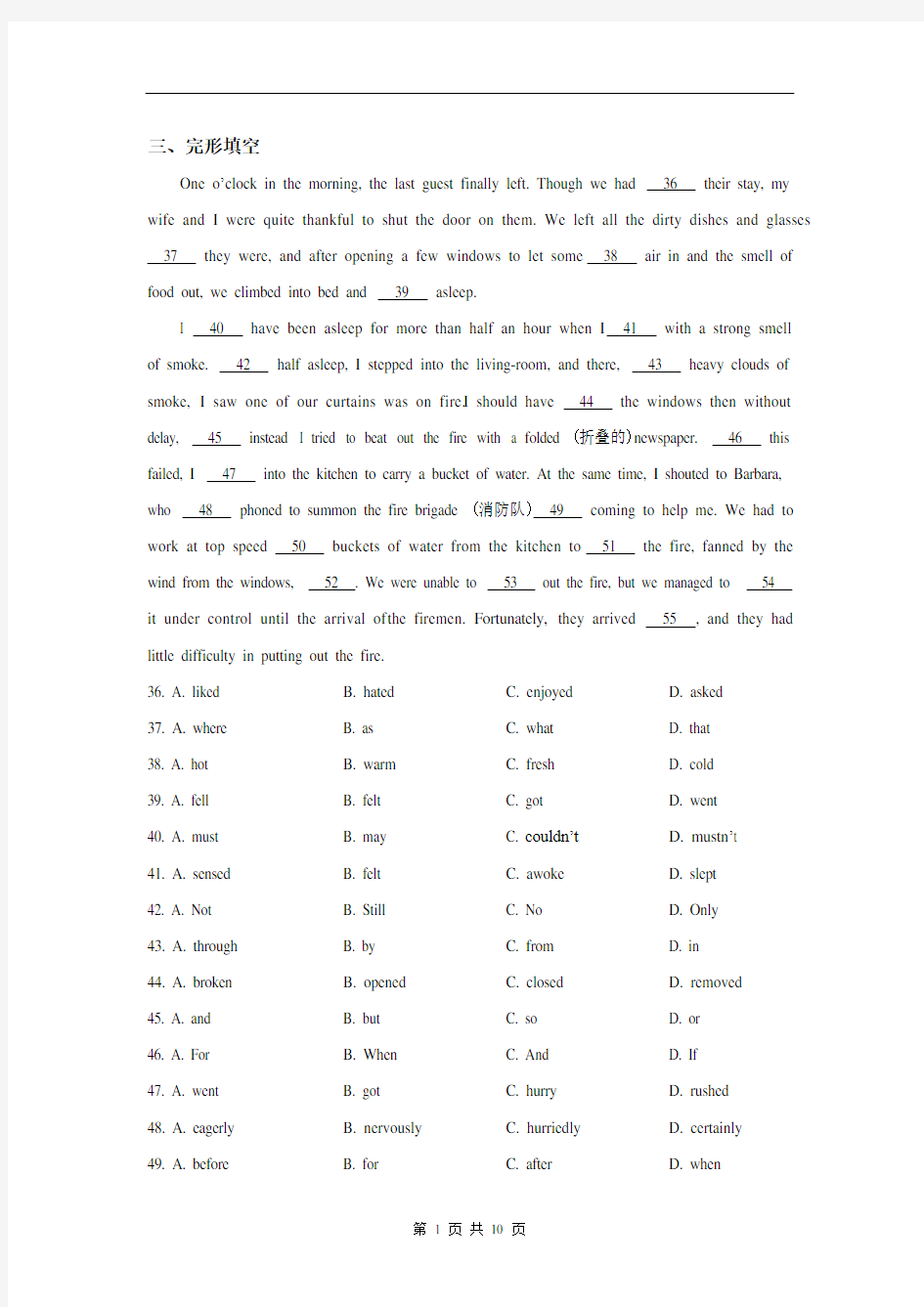
人教版高一英语必修四综合测试题
- 格式:doc
- 大小:99.50 KB
- 文档页数:10


三、完形填空
One o’clock in the morning, the last guest finally left. Though we had 36 their stay, my wife and I were quite thankful to shut the door on them. We left all the dirty dishes and glasses 37 they were, and after opening a few windows to let some 38 air in and the smell of food out, we climbed into bed and 39 asleep.
I 40 have been asleep for more than half an hour when I 41 with a strong smell of smoke. 42 half asleep, I stepped into the living-room, and there, 43 heavy clouds of smoke, I saw one of our curtains was on fire. I should have 44 the windows then without delay, 45 instead I tried to beat out the fire with a folded (折叠的)newspaper. 46 this failed, I 47 into the kitchen to carry a bucket of water. At the same time, I shouted to Barbara, who 48 phoned to summon the fire brigade (消防队)49 coming to help me. We had to work at top speed 50 buckets of water from the kitchen to 51 the fire, fanned by the wind from the windows, 52 . We were unable to 53 out the fire, but we managed to 54 it under control until the arrival of the firemen. Fortunately, they arrived 55 , and they had little difficulty in putting out the fire.
36. A. liked B. hated C. enjoyed D. asked
37. A. where B. as C. what D. that
38. A. hot B. warm C. fresh D. cold
39. A. fell B. felt C. got D. went
40. A. must B. may C. couldn’t D. mustn’t
41. A. sensed B. felt C. awoke D. slept
42. A. Not B. Still C. No D. Only
43. A. through B. by C. from D. in
44. A. broken B. opened C. closed D. removed
45. A. and B. but C. so D. or
46. A. For B. When C. And D. If
47. A. went B. got C. hurry D. rushed
48. A. eagerly B. nervously C. hurriedly D. certainly
49. A. before B. for C. after D. when
50. A. taking B. getting C. sending D. carrying
51. A. beat B. fight C. prevent D. make
52. A. rising B. burning C. lighting D. spreading
53. A. get B. put C. keep D. take
54. A. keep B. leave C. make D. hold
55. A. at one time B. at a time C. in no time D. at no time
四、阅读理解
A
If you called someone a scientist in the early eighteenth century they would have thought of someone who improved on practical designs. Benjamin Franklin was such a scientist. He liked asking questions and then trying to find out the answers. For example, he thought that storms moved in the opposite direction to the winds that went with them. He suggested that it would be possible to mark the path of a storm on a map. To prove it he rode into a storm and then followed it down the road. Today people do not chase storms but they do mark their journeys down on maps.
Since Benjamin Franklin spent so much time sailing from America to Europe, he became very interested in sea currents. In November, 1783, when he was in Paris, he happened to watch the first hot air balloon flight. He thought that hot air balloons could be used for war, perhaps for spying or dropping bombs on an enemy! But sadly he died before the first American hot air balloon flight.
56. The passage mainly tells us that Benjamin Franklin .
A. worked on electricity
B. thought scientifically
C. liked to do experiments
D. could do things better than others
57. The example in the first paragraph is used to suggest .
A. Franklin was thinking in a different way
B. storms and their winds go in different directions
C. Franklin was someone who tried to find out how things worked
D. Franklin’s observation is of great use to today’s meteorology
58. What can we infer from the last paragraph?